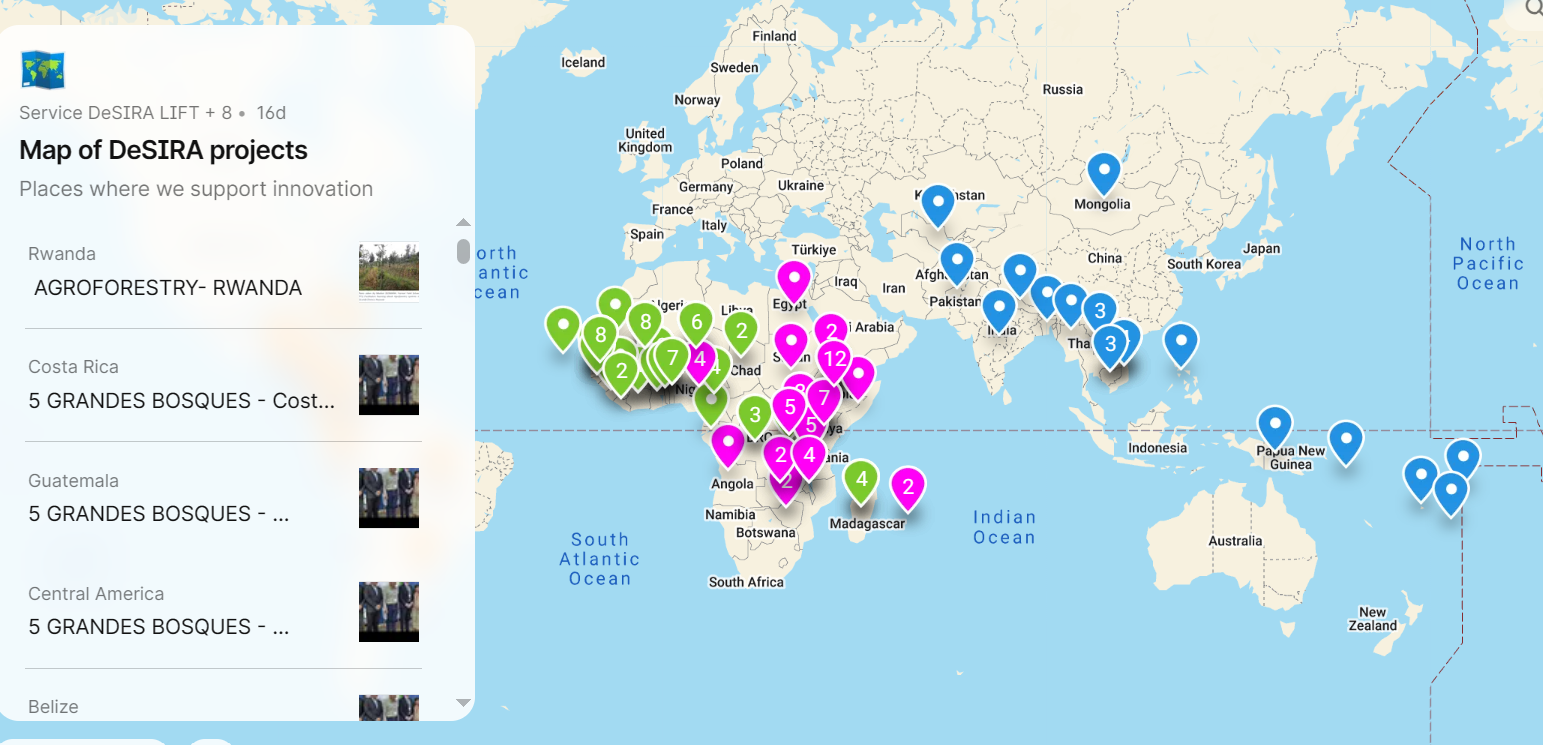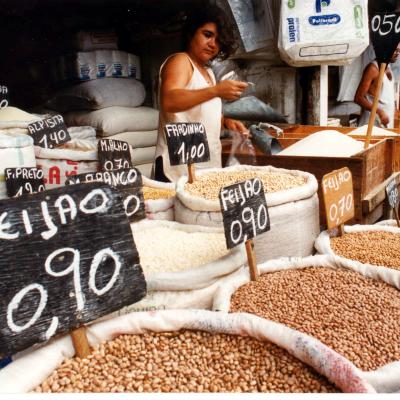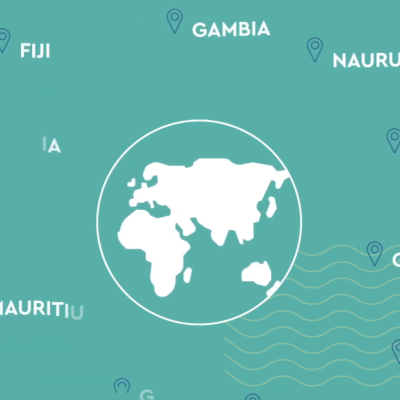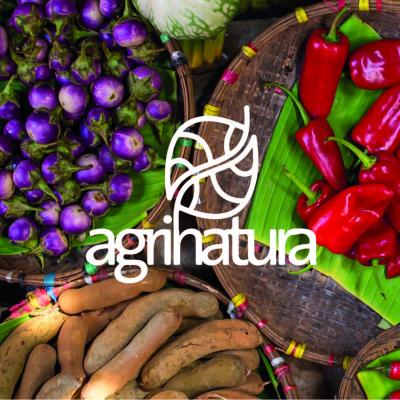Description
Objectives
- The objective of the DeSIRA initiative is to contribute to climate-relevant, productive and sustainable transformation of agriculture and food systems in low and middle-incomes countries
- DeSIRA aims to put more science into development considering that the solutions to achieve the Sustainable Development Goals (SDG) are context specifics. Agroecology and nature based solutions are part of the solutions supported by research.
- DeSIRA aims at supporting research and innovation projects in Africa, Asia, Latin America and strengthening research capacities and research governance.
About Development Smart Innovation through Research in Agriculture – DeSIRA
Index:
- Objectives
- Context
- DeSIRA strategy
- The structure of DeSIRA
- Governance and funding
- Collaboration
- Monitoring and Evaluation
- Map of the projects
- Link to documents
Objectives
- The objective of the DeSIRA initiative is to contribute to climate-relevant, productive and sustainable transformation of agriculture and food systems in low and middle-incomes countries
- DeSIRA aims to put more science into development considering that the solutions to achieve the Sustainable Development Goals (SDG) are context specifics. It contributes primarily to the achievement of SDG 1 (no poverty), 2 (zero hunger), 5 (Gender equality), 8 decent work and economic growth and 13 (climate action) and 15 (Life on Land),
- DeSIRA aims at supporting research and innovation projects in Africa, Asia, Latin America and strengthening research capacities and research governance involving key actors at national, regional, continental and global levels
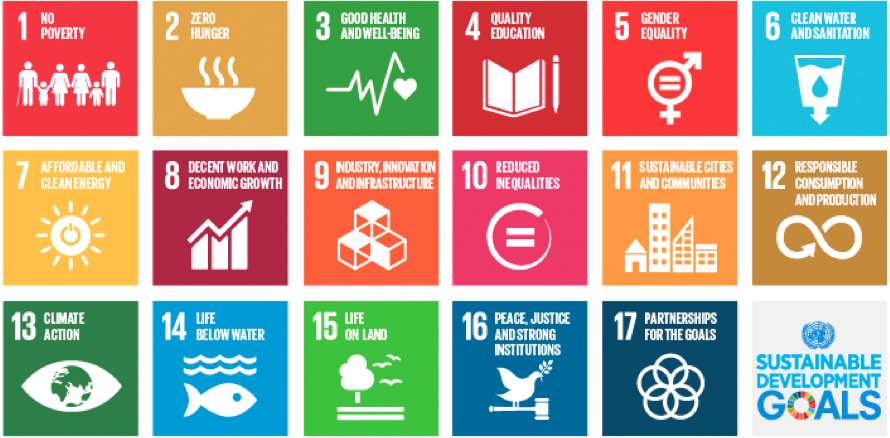
Context
There is a global consensus emerging around the challenges the agricultural and food systems face (climate change, loss of biodiversity, high pressure on resources, etc.) and the objectives to be achieved and set-up by the SDG. Even if the pathways to transform the agri-food systems are controversial (sustainable intensification, climate smart agriculture, agroecology or nature based solutions), all the actors agree for supporting innovation to design and implement new solutions at scale.
To put it simple innovation is introducing a novelty in an economic and social environment. Innovation can be characterized in different ways depending on its characteristics (product vs process, technical vs organizational or social, radical vs incremental, endogenous vs exogenous, top-down vs bottom-up, etc.). An innovation combines the implementation of new techniques and practices (constituting the ‘hardware’), new knowledge and ways of thinking (‘software’) and new institutions and organizations (‘orgware’). The innovation can be promoted by a specific actor (the entrepreneur, the firm, etc.) or by a network of different types of actors (farmers, NGO, firm, research) taking into account that actors innovate and research propose novelties. Innovation could be at farm level with new agricultural or management practices, at value chain level with new processing or marketing methods, at territorial level with new rules for natural resources management, or at policy level with new rules and norms. However, there is a debate on the type of innovation to be promoted as innovation can have positive or negative impacts depending on the dimension (economic, social, environmental) or on the point of view (civil society, firms, policy makers). Responsible innovation for a green and inclusive transition of the food systems is a key issue.
- With such a perspective, research for innovation needs to combine fundamental research, participatory research or action-research based on a plausible theory of change to achieve desirable impacts at scale. This means that research must conduct several research activities in partnership with other actors : knowledge production, design of methods, facilitation, capacity building, expertise, etc.
- To support innovation processes, there is a need to strengthen the capacity of researchers and research organizations to design, monitor and assess research to achieve impacts and address the urgent challenges. There is also a need to strengthen the capacity to innovate of a much larger range of actors : farmers, farmers’ organizations, local communities, NGO, private sector, public sector
- The top-down transfer of knowledge and technology model is no more valid to address systemic changes needed to promote sustainable food systems in a context of rapid transitions. Because innovation is a complex process including technical, organizational and institutional dimensions and mobilizing a wide range of actors (farmers, farmers’ organizations, NGO, advisory services, private firms, etc.), public policies need to rely on multi-stakeholder approach to produce new knowledge making use of scientific knowledge and local knowledge, mobilize resources, and synergize competencies.
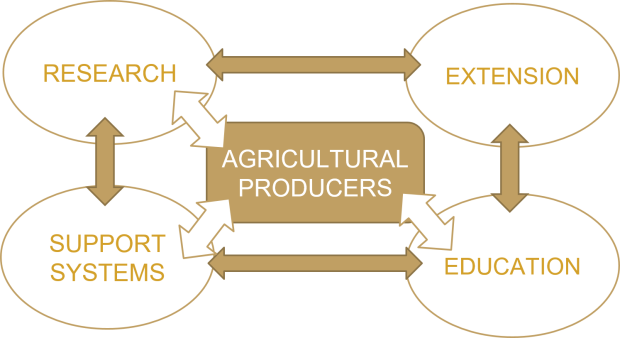
DeSIRA strategy
The DeSIRA strategic approach looks for a relevant contribution to support the transition of agricultural and food systems. This strategic approach is based on several principles:
- Joint construction of DeSIRA interventions in line with both EU & EU Member States development agendas and national priorities regarding agriculture and food systems
- Linking research and innovation with a multi-stakeholder approach to contribute to impacts at scale addressing climate change and supporting agroecological approaches and other innovative approaches with clusters of projects funded by EU and Member States
- Strengthening national research capacities both at individual and organizational levels to fully address urgent development challenges
- Contributing to the continental (Africa) and global governance of research through support and interactions with GFAR, CGIAR, and AIRCA
- Building strong partnerships involving European, International and National research capacities to mobilize the best expertise
- Fostering of Agricultural Innovation Systems and national innovation policies with a Capacity to innovate based approach
The structure of DeSIRA
DeSIRA includes 3 pillars
- Pillar 1: Research and innovation in agricultural and food systems : Fostering innovation in agriculture and food systems is at the core of DeSIRA. It includes a broad range of thematics valorizing on agroecological principles
- Pillar 2: Research infrastructure conducive to Innovation. The institutional architecture for governance of AR4D at the global level and in some regions is well established, although still fragile. DeSIRA is supporting the organizations in charge of the governance of research at regional, continental and global level.
- Pillar 3: Knowledge and evidence to feed policy design. The EU Scientific expertise is mobilized to support the whole DeSIRA, to provide strategic thinking and actions regarding innovation, and to help draw lessons for better research and innovation policies.
Governance and funding
- DeSIRA is supported by key political and institutional commitments (UNFCC CoP 21, One planet summit 2017, Ouagadougou declaration 2018) and is designed based on key consultations (European Member States, EU Delegations, CAADP, FAO, GFAR, IFAD, BMGF). DeSIRA is fully aligned with the new European Policy on the Green Deal.
- The research and innovation projects are identified either by the EU delegations in the countries based on national or regional priorities or by the European Member States within a co-funding framework. Research organizations and other actors (NGO, Farmers’ organizations, private sector) interact with EU delegations and European Member State to propose and elaborate projects.
- The governance of DeSIRA is based on several mechanisms: the first one is the Platform involving EU Member States and key partners to share information and orient DeSIRA , the second one is a Technical Advisory Board (to be set-up) to help assess and monitor DeSIRA , the third one is regular concertations with global actors supported by DeSIRA (GFAR, CGIAR, AIRCA, TAP/FAO, FARA, AFAAS, CORAF, ASARECA, CCARDESA, etc.) and aiming at coordinating or supporting research and innovation interventions.
- The funding is coming from the European Commission ((Development Cooperation Instruments) under the Global Public Goods and Challenges Thematic Programme. It represents around €300 million.
Collaboration
DeSIRA is articulated to different research programmes or research organizations intervening in the global South through in-depth interactions with:
- Regional or continental research organizations for a better planning, monitoring and evaluation of national research and support to innovation
- CGIAR and AIRCA through joint research and innovation projects and cross-cutting collaborations
- Agrinatura which is a grouping of European universities and research organizations dedicated to research and education for development
- Other EU Directorates (DG RTD, DG AGRI) fostering international research, especially in Africa to address Food and Nutrition Security and Sustainable Agriculture (FNSSA)
Monitoring and Evaluation
The Directorate-General for International Partnerships of the European Commission (DG INTPA) has designed and is implementing a global Monitoring and Evaluation (M&E) framework to steer and monitor the DeSIRA initiative, to determine the extent to which its overarching objectives are being achieved, and to report and communicate more efficiently, internally and externally, on new approaches to agricultural research and innovation.
For more information, see "projects", pillar 3.
Map of the projects
The information on the map is based on data available from the projects and open sources and does not reflect all project information. It is updated whenever new information is collected. If you wish to submit information on your project, please write to community@desiralift.org.
Video and PPT
DeSIRA presentation : ![]() desira_presentation_-_november_2020.pdf
desira_presentation_-_november_2020.pdf

